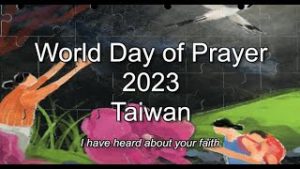 Introduction
Introduction
 The World Day of Prayer is a global ecumenical movement which brings Christians of many traditions together to observe a common day of prayer each year. Through preparation and participation in the worship service, we can learn how our sisters of other countries, languages and cultures understand the Biblical passages in their context.
The World Day of Prayer is a global ecumenical movement which brings Christians of many traditions together to observe a common day of prayer each year. Through preparation and participation in the worship service, we can learn how our sisters of other countries, languages and cultures understand the Biblical passages in their context.
We can hear their concerns and needs and can join in solidarity with them as we pray with and for them. In this way, it is possible to enrich our Christian faith as it grows deeper and broader in an international, ecumenical expression.
The motto of the World Day of Prayer movement is Informed Prayer and Prayerful Action. Through our participation in the World Day of Prayer, we affirm that prayer and action are inseparable and that both have immeasurable influence on the world.
World Day of Prayer in Canada
The World Day of Prayer traces its roots to the 19th century when Christian women of Canada and the United States became involved in missions at home and worldwide. Since 1812, women have encouraged one another to engage in personal prayer and lead communal prayer within their mission groups. Presbyterian women in the United States then called for a national day of prayer in 1887, and Anglican women in Canada established a national day of corporate intercessions for mission in 1895.
On October 19, 1918, Presbyterian women in Canada called together representatives of five Women’s Missionary Boards – Anglican, Baptist, Congregational, Methodist and Presbyterian – “to promote the spreading of Christ’s kingdom through united prayer and action.” That first inter-church meeting gave birth to the Interim Committee on the Federation of the Women’s Missionary Society Boards of Canada, which organized a national and inter denominational day of prayer on January 9, 1920.
In 1922, the Canadian and U.S. committees agreed to use the same theme and day for the Day of Prayer as U.S. women. This annual event became the Women’s World Day of Prayer in 1927. The Canadian committee changed its name to become the Women’s Inter-Church Council of Canada and now includes representatives from 11 church partners. This council continues to coordinate the World Day of Prayer in Canada and to speak to issues that concern women of faith across the country.
 There are an estimated 370 million indigenous people in the world, living across 90 countries. They make up less than 5 per cent of the world’s population, but account for 15 per cent of the poorest. They speak an overwhelming majority of the world’s estimated 7,000 languages and represent 5,000 different cultures.
There are an estimated 370 million indigenous people in the world, living across 90 countries. They make up less than 5 per cent of the world’s population, but account for 15 per cent of the poorest. They speak an overwhelming majority of the world’s estimated 7,000 languages and represent 5,000 different cultures. According to multiple surveys and its bestselling status decade after decade, the Bible is widely revered by people around the world. Millions of visitors from more than 200 countries regularly come to Bible Gateway to freely read, hear, search, study, compare, & share the Bible in more than 70 languages & more than 200 Bible versions.
According to multiple surveys and its bestselling status decade after decade, the Bible is widely revered by people around the world. Millions of visitors from more than 200 countries regularly come to Bible Gateway to freely read, hear, search, study, compare, & share the Bible in more than 70 languages & more than 200 Bible versions.